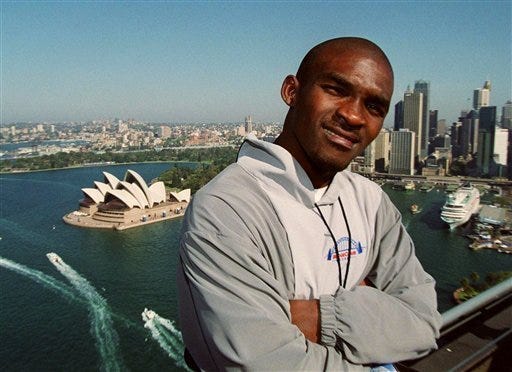Even I Knew About This CorruptionI Could Have Warned the Trump Administration Not to Give $7.5 Million to Equatorial GuineaI’m not saying bribing countries to take our deportees is easy. I’ve never even thought about flying desperate immigrants that we don’t feel like processing to some country they’ve never heard of. Or that our president has never heard of. But even I know not to pick Equatorial Guinea. And I’ve known it for 25 years. That’s when I encountered their corruption personally. Two days ago, the top Democrat on the Senate Foreign Relations Committee, Jeanne Shaheen of Keene¹, New Hampshire, wrote an official letter on official stationery to Secretary of State Marco Rubio warning him against giving the government of Equatorial Guinea $7.5 million. She wrote:
She also worried that the President’s son, who is also the vice president and is under visa restrictions by the U.S., would use the deportees as sex slaves, which is something he isn’t hiding all that well by buying Michael Jackson memorabilia. He might also send them to either Black Beach Prison or Oveng Ansen Prison, which Shaheen says are “known for serious human rights abuses,” which I had already guessed by their names. Although the U.S. has given far smaller amounts of aid to Equatorial Guinea, we carefully handed that money to aid groups, not the government, knowing they would use it for corruption. I trust Shaheen, since she’s a person who can use words such as “Equatoguinean.” But I also know she’s right from first-hand experience. I first became aware of rampant corruption in Equatorial Guinea in September of 2000, when I was sent to Australia for a month by Time magazine to cover the Olympics, and immediately began my own corruption. I started by skipping the Opening Ceremonies and expensing an expensive dinner instead. When I got a call during the meal from the editor of the magazine asking me to write an article about the opening ceremonies, I sobered up as much as I could, called someone who had watched it on TV, and wrote for nearly a full hour. After a trip to the Blue Mountains, where no Olympic sports were being played, I found out about someone in Sydney even more corrupt than I was. And he was from Equatorial Guinea. Eric Moussambani was an athlete from Equatorial Guinea who swam in the first heat of the 100-meter freestyle. After the other competitors were disqualified for jumping at the “on your mark” part, Moussambani had to swim alone. Moussambani had never even come close to swimming two pool lengths before. Halfway through the race, he started flailing and seemed in danger of drowning. But he prevailed, clocking in at 1:52.72. That’s 1:04.08 longer than it took gold-medal winner Pieter van den Hoogenband and 50.27 longer than Moussambani’s closest competitor, the 70th-place swimmer from Bahrain. It turned out that before he decided to go to Sydney, Moussambani didn’t know how to swim. Because Sydney, as part of the bid that brought the Olympics to the most ridiculously located country in the world, promised to fly any athlete to the Games, Moussambani was able to get free airfare, housing at the Olympic Village, and food at the cafeteria. The Sydney Morning Herald wrote that he exhibited the true Olympic spirit, not once using the phrase “ballsy hucksterism.” The Today show did an interview; the Olympic Committee took him to lunch and put him on a postcard; Speedo bought him a uniform. The way I saw it, Moussambani was more than a hero; he was a name I could put on my expense account. I offered to take him to 41, one of the most expensive restaurants in Sydney. He accepted, then called later to say he could come only if I took all three of his fellow Equatorial Guinean athletes. And their coaches. I immediately agreed. Despite the language barrier, we all enjoyed the five-course meal and learned we had much in common. Sure, Moussambani had never read Time, and I had no idea where his country was, but we both knew how to exploit a system. He and his fellow swimmer Paula Barila Bolopa, who swam the 50-meter in 1:03.97, doubling the second-worst time, had received money to be interviewed by Australian papers. And Moussambani had already turned down an ad campaign. “Speedo offered to sponsor me, but I didn’t like the contract,” he said, eating baked Alaska as the waitress came over with a stack of menus to be signed. Moussambani was doing his best to thrive in a corrupt system. I didn’t realize it then, but I was training for the same thing. 1 Fine, her house is actually in Madbury, New Hampshire. Thank you for paying to read my column. Wait: This is for the people who didn’t pay? Then I owe you nothing. You are the ones contributing to the end of my career. If you want to pay an exorbitant amount of money to get one extra post a month – which often won’t even be that good – upgrade to a paid subscription here: |
Wednesday, November 12, 2025
Even I Knew About This Corruption
Subscribe to:
Post Comments (Atom)
The Shutdown, the Midterms, and Fighting Back Against MAGA with Jim Acosta.
Watch now (64 mins) | A recording from Dan Pfeiffer and Jim Acosta's live video ͏ ͏ ͏ ͏ ͏ ͏ ͏ ͏ ...
-
17 Personal Finance Concepts – #5 Home Ownershippwsadmin, 31 Oct 02:36 AM If you find value in these articles, please share them with your ...


No comments:
Post a Comment